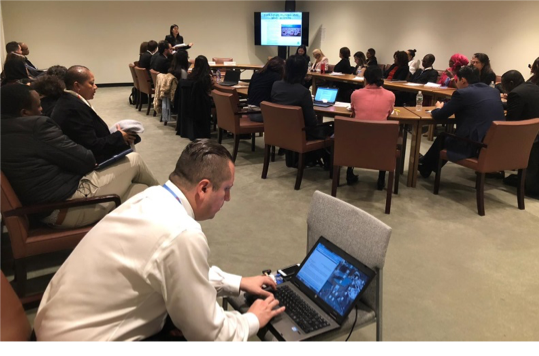UNITAR Held Course on Conflict Resolution and Ensuring Access to Justice in Developing Nations
26 October 2018, New York City, USA - The United Nations Institute for Training and Research (UNITAR), in collaboration with the Columbia Law School, hosted the first lecture of its three-part lecture series sponsored by the Permanent Mission of Sweden as a part of the programme “Levelling the Playing Field to support the Least Developed Countries’ (LDCs) and Small Island Developing States’ (SIDS) Diplomats”. “Conflict Resolution and Ensuring Access to Justice in Developing Nations” was the topic of discussion, and was held in the United Nations Headquarters in New York, USA.
 Head of UNITAR New York Office, Mr. Marco Suazo, opened the session by welcoming the participants of the training session. He then introduced the speakers: Professor Alexandra Carter, Director of the Mediation Clinic, Columbia Law School; Professor Shawn Watts, Associate Director of the Mediation Clinic, Columbia Law School; and students of Columbia Law School: Ms. Lydia Cash, Ms. Kate Lee, Ms. Bojun Xu, Mr. Anand Srivastava, and Ms. Maryam Najam. The Workshop focused on two main concepts: (1) developing an understanding of skills for peaceful dialogue and cooperation, and (2) learning how other countries utilize mediation through three case studies.
Head of UNITAR New York Office, Mr. Marco Suazo, opened the session by welcoming the participants of the training session. He then introduced the speakers: Professor Alexandra Carter, Director of the Mediation Clinic, Columbia Law School; Professor Shawn Watts, Associate Director of the Mediation Clinic, Columbia Law School; and students of Columbia Law School: Ms. Lydia Cash, Ms. Kate Lee, Ms. Bojun Xu, Mr. Anand Srivastava, and Ms. Maryam Najam. The Workshop focused on two main concepts: (1) developing an understanding of skills for peaceful dialogue and cooperation, and (2) learning how other countries utilize mediation through three case studies.
The morning session began with Professor Carter describing various skills required for peaceful dialogue and cooperation, and the use of those skills to promote inclusive societies for sustainable development with a specific focus on Sustainable Development Goal – 16. The participants then engaged in a group exercise on, “How is ADR used in their home country?” Each group presented their solutions with a variety of ideas and diverse perspectives. Professor Carter then focused on the importance of mediation to ensure peaceful dialogue and conflict resolution.
The morning session was primarily skills-based, and participants practiced active listening techniques, involving asking the right questions, and unpacking facts, interests, and feelings through various exercises and interactions. The afternoon session had participants focus on relevant, real-world case studies taking place in Haiti, Nepal, and Syria and Iraq.

The first case was on Haiti. In Haiti, intensive workshops on conflict resolution were carried out at the local level by international organizations such as the United States Institute of Peace (USIP) and the U.N. Stabilization Mission in Haiti (MINUSTAH). The goal of these workshops was to mediate conflict through dialogue and help prevent violence in Haiti. These local-oriented, community-focused trainings have achieved major consequences: increasing the trust for international organizations and inspiring the founding of a country-wide organization to unite previously piecemeal community action groups.
The second case study was centered on Nepal. The purpose of this mediation procedure was to empower disenfranchised women in Nepal and, ultimately, to achieve a variety of goals such as gender equality and high-quality education. The training was aimed at uplifting women by providing them with mediation skills that would help them gain positions of respect and authority within their communities, as well as combat the negative effects of the caste system. As women often face a range of issues in Nepal, mediation was found to be much needed on the local level, especially considering the financial and geographical inaccessibility of formal litigation. Topics such as gender equality were found to be less prevalent and less relatable for people in local communities. Eventually, it was seen that the Nepal community mediation programs havethe effect of making incremental changes in the status of women, and that community mediation offers women the tools to act and speak up on their own behalf. At the end of the case study, it was noted that over 22,400 mediation cases were solved through women mediators in Nepal, proving how female participation in negotiation and mediation can increase and improve the living status of women in Nepal.

The third case study included two countries: Syria and Iraq. The Mercy Corps, a humanitarian relief and development organization that works with Syrian refugees in Jordan, Lebanon and Iraq, provides mediation training to Syrian refugee leaders and host communities. Programs in Syrian refugee camps in Jordan have elevated the violence and anger between different local parties. Meanwhile, programs in Iraq created a nationwide network of 200 mediators, which led to a measurable reduction in violence.
After a comprehensive review of the three case studies, the participants had the chance to practice their negotiation and mediation skills through tasks such as role play. The afternoon session, focusing more on practicality, made sure the participants both understood the theory and the application of the skills they acquired.
This highly intensive, informative and interactive session strengthened participants’ knowledge on mediation and negotiation, and most importantly, how mediation can help elevate local living standards.
Photo 1: Professor Carter describing various skills required for peaceful dialogue and cooperation, and highlighting its use in Sustainable Goal 16 Peace, Justice and Strong Institutions.
Photo 2: Participants taking part in the first group exercise of the workshop, discussing how ADR is being used in their respective countries.
Photo 3: Professor Carter going over several country case studies and their mediation efforts.

